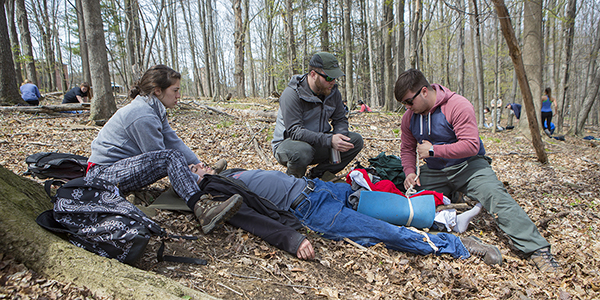Get class credit for going outside with Outdoor Pursuits

Pushing past your comfort zone is one of the best ways to learn a new life skill. So why not take a course that goes beyond the boundaries of a classroom? Through Outdoor Pursuits, Binghamton University students can take credit classes with nature as the classroom, and learn wilderness skills while fulfilling General Education requirements.
There’s a wide range of options for all kinds of learners. For those wanting to immerse themselves in Binghamton’s natural landscape, hiking instructor Elias Miller teaches students safe, sustainable hiking practices that encourage students to build a relationship with the natural world around them.
“I enjoy taking students into the woods, especially those who don’t have experience hiking, and watching them react to things outdoors that I might take for granted,” he said. “I hope students will develop a long-term interest in hiking and continue to hike after the course ends.”
To Miller, being a good hiker is much more than being able to climb the highest mountains. It extends beyond the physical body: his students develop a knowledge of the wilderness and practice mindfulness to achieve greater harmony with the environment.
“I think hiking benefits students in terms of managing mental health. We practice the Japanese concept of forest bathing, which means spending time meditating in nature,” he said. “My students use this time to focus on things in nature that are different from their daily lives, and it gets them to live presently.”
While hiking and forest bathing is great for developing general physical and mental health, some students might prefer to develop a specific, practical skill set. For them, Backcountry Medicine teaches basic wilderness first aid, and helps students become safer and smarter in the outdoors. Instructor Kevin Hastings favors hands-on lessons over theoretical learning.
“I emphasize a learning-by-doing approach. If my students choose to spend time outside, I want them to be able to handle an emergency and feel well-prepared in any situation,” he said.
Hastings’ students learn about the forest and how to utilize the natural resources to help someone in trouble. They craft splints from sticks, learn how to move injured patients and develop a greater awareness of natural dynamics in the process.
“We’re out in the woods the entire session, doing hands-on care. We role-play scenarios where students play the role of the rescuer. They learn to deal with injuries, illness, hypothermia, things like that,” Hastings said.
These kinds of skills are useful for everyone, whether you’re a lifelong skier or a newbie taking nature walks. Armed with increased awareness of the environment around them, students can leave the class with peace of mind, prepared to protect themselves in an outdoor emergency scenario.
Backcountry Medicine focuses on the utility of natural landscapes and plants, but if students are more interested in animals, English Horsemanship is another option to consider. The class is offered by Unity Stables, a nearby facility housing over 50 horses with a riding path and a pond.
“I teach horses and humans,” said Cailin Elliott, a Unity Stables horse trainer and instructor. “Students learn how to catch a horse, put a halter on, lead a horse, groom one… and of course, how to ride one.”
Horseback riding is a full-body workout, using many of the same muscles as yoga and gymnastics. But students will find that the course is much more than a simple riding lesson: it’s about expanding their understanding of animals and developing a bond with another living thing.
“Working with animals has such a positive influence on a human’s ability to deal with conflict and have empathy,” Elliott said. “When you’re on a horse’s back, you might get frustrated or fearful, but you learn to channel those things. You learn to work together with animals, which helps you work better with other people.”
Horsemanship is a great option for people who want to push themselves out of their comfort zone. Many students who take the course have no experience riding, so come into the course feeling anxious.
“It’s normal to be nervous; everyone is nervous. But we prioritize safety and these horses are great at their jobs,” Elliott said. “I love watching students become more confident in their abilities over the course of the semester. Not many courses in a university are going to challenge you and make you overcome your fears.”
Consider taking up the challenge! Beyond these three courses, options include Disc Golf and Fly Fishing. But no matter which you choose, you’ll expand your understanding of the outdoors and encounter Binghamton’s natural beauty firsthand. Break out of routine with an Outdoor Pursuits class. When you return to the classroom, you’ll have a deeper connection with the world just outside the window.
Outdoor Pursuits is a program area under Campus Recreation. Learn more about Campus Recreation’s programs and services by visiting the website, play.binghamton.edu.
